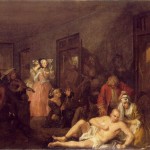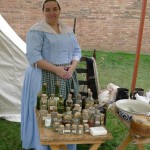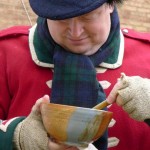Under General Braddock’s Command at the Carlyle Residence
Posted By Doctor Clift on April 18, 2011
(Bloggers note: This entry will discuss the history of nursing, in its dark underbelly of beginnings. For any nurses reading my entries, I highly respect how important you are today and am grateful for everything you do!)While the majority of denizens of DC were staying up late to find out if they had jobs on Monday morning, I was prepping on Friday night the 8th of April preparing to be in the service of General Braddock at the lovely Carlyle House in Alexandria, Virginia.
I had been asked to play a nurse assistant to Charlotte Browne, who was the sister to the apothecary on Braddock’s Campaign to Fort Cumberland, and later, towards Fort Duquense. Charlotte was the matron of the hospital at Fort Cumberland, and later would become the first woman to be listed on the Military rolls and take a commission. I chose a family name, Fannie, and took my herbs, my bloodletting implements, and a few other display items. It was a much sparser layout than I’m used to, but it was a different role than I’m used to as well. Dressing as a lady is not one of my regular 18th century activities, and I had figured that I would only use a small amount of the vast knowledge I have on 18th Century medicine.
Nursing in the 18th Century was considered the lowest of the low professions. In the hospitals in London, most of the nurses were criminals or prostitutes, and instead of performing the actual duties of a nurse, they would take money from the patients to procure them liquor from the local pub, or to provide them that special comfort that a lady can offer a gentleman. Actual duties of the nursing staff would include changing bed linens, washing bed linens, feeding patients, cooking for patients, and occasionally changing bandages as ordered by the Matron, or head Nurse. On the military campaign, the nurses were the wives of the soldiers who came with their husbands on campaign. Ladies were expected to earn their keep by laundressing, or cooking, or nursing, and in some units, it was a rotation that every lady was expected to take their turn at. However, having such a lurid history, it was not a duty the ladies enjoyed, and most did poorly at it. Charlotte Browne actually describes this in her diary- the uselessness of her own assistant.
The other disadvantage to having the wives of soldiers as the nursing staff for any military campaign was that if their husband was wounded, the wife would then want to only dote upon their husband. If he died, they would in many cases, leave the military unit behind to return to the city. During Braddock’s Campaign in 1755, after the massacre at the Monongahela, many women left Fort Cumberland to go to attend to their husbands there, while many also left to return to civilization as well, leaving Charlotte to attend to many of the patients by herself, while seriously ill!
Having these bits of information within my head, as well as other facts about women with Braddock’s Army {Braddock ordered all the women checked for Venereal Disease (gonorrhea and syphilis) twice during the campaign (which was less than a year, mind you)}, I left my house early Saturday morning to head to Alexandria.
The Grandest Congress was a meeting held with several Colonial Governors, including Dinwiddie of Virginia and Sharpe of Maryland, with General Braddock, to discuss his campaign to oust the French from the area of what is now Pittsburgh, Pennsylvania. Also in this discussion, they tried to make a decision on who would be paying for the campaign, as the King had decreed that the Colonies should try to fund some of it. Braddock’s troops were also quartered in Alexandria as well at this time, and he would end up leaving 50 ill troops behind before continuing the march to Cumberland. We had all of our governors, servants, Mr. and Mrs. Carlyle, Charlotte Brown, General Braddock, laundresses, kitchen hands, a town Doctor, myself as nurse, and several troops in attendance. I even had one patient to care for!
There wasn’t a lot of visitors, but the visitors who did attend asked great questions and hung around for a fair amount of time. They inquired upon my patient, and upon the herbs and such on my table, and my responsibilities, and asked questions about the menu for the patients I had laid out.
Thanks to another Doctor friend, I had a general menu for the hospital patients, and many people seemed to be really interested in the day to day meals of the men, and it just so happened they were in for a suprise. The fabulous cook had made me some water gruel.
Now, what, you may ask, is water gruel? Make some oatmeal, and then strain out all the oats, leaving just the pasty looking water. Then, if you’re feeling particularly generous, add a pat of butter while its still hot. It truly is quite the delectable treat! Just look at my patient!
I will admit to tasting it, and then begging General Braddock that if I should be taken ill, to not be served it. Literally, Elmer’s Glue and butter.
But all was not lost, as the cook had made us an amazing meal consisting of fantastic potato soup, fish, meat pies, and seedcake. We were even given tastes of some of the food that the Governor’s supped on as well, including a fantastically roasted chicken.
All in all, I found that I did end up pulling from my knowledge of surgery of the time, as well as my knowledge of the actual engagement that was about to follow a lot more than I had anticipated. It was truly a great day, and I can’t wait to do it again next year!
Notes: Many thanks to Jane Pease for the pictures from the day and for being a Lovely Charlotte Brown, and to Kimberly Walters for the Water Gruel and for letting me know about this event. And last but not least, a great Thank You to Dan McMahon for the “reviving victuals” for any patient that arrived at the hospital for treatment.




Comments
Leave a Reply